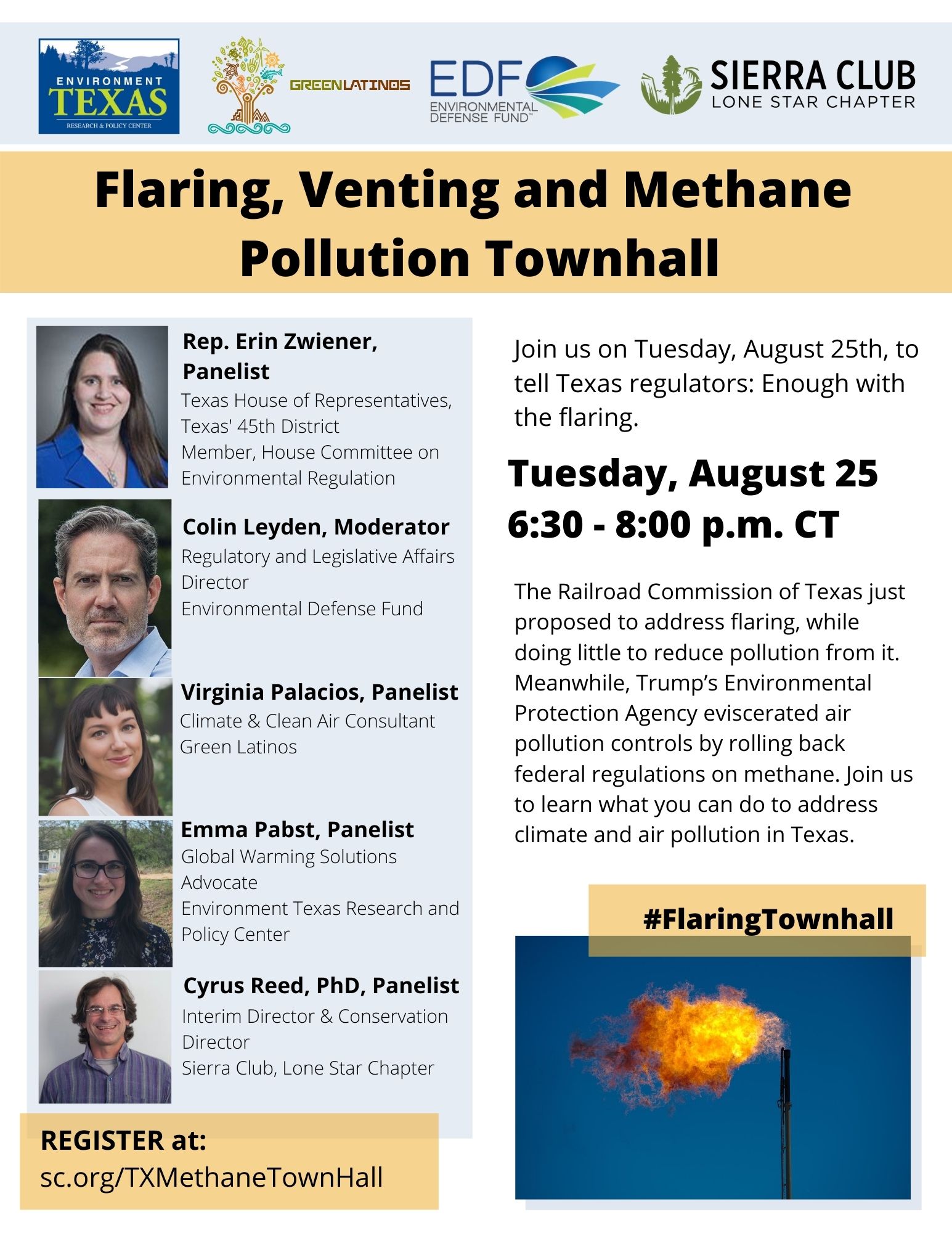
The Lone Star Chapter of the Sierra Club joined forces with Green Latinos, Environmental Defense Fund, Environment Texas, and Texas State Representative Erin Zwiener (D-HD45) earlier this week in hosting a virtual townhall on oil and gas air pollution that is rampant in Texas. Approximately 70 participants tuned in to the event.
Rep. Zwiener, a member of the Environmental Regulation Committee in the Texas House, made note of a recent letter sent by herself and 14 other State Senators and Representatives calling on the Railroad Commission of Texas (RRC) to take action on the rampant flaring and venting by setting a goal to eliminate routine flaring and venting by 2025.
Zwiener and other panelists noted in the virtual townhall that the Commission had put forward a half-step proposal to improve data and documentation required by the Commission, but the proposal doesn’t actually require pollution reduction. She also announced the formation of a new committee in the Texas House to deal with climate change and other environmental issues that impact Texas.
Colin Leyden, with the Environmental Defense Fund, highlighted recent work by his organization to detail the amount of flaring, venting and methane emissions that is occurring in the Permian Basin, even as oil and gas drilling has been reduced during the economic slowdown. He noted that separate studies had estimated leakage rates of methane of between 3.4 and 3.7 percent in the Permian Basin, and that despite recent statements from the Railroad Commission of Texas, flaring numbers increased in June (even though oil production declined in June). He also called on the Railroad Commission to be more aggressive in eliminating pollution and the waste of the resource.
Virginia Palacios, a consultant with Green Latinos, noted that the failure by the RRC to take a more aggressive approach is compounded by the recent decision of the Trump Administration to roll back previous standards to control emissions of methane, a greenhouse gas that contributes to and exacerbates climate change, that also impact communities, particularly low-income Latinx communities in West and South Texas. Palacios noted that recent studies in South Texas show that Latinx mothers living close to areas that frequently flare are more likely to have short-term births, while drilling without adequate pollution control can lead to other health outcomes. Palacios said with the federal government now abrogating on its duties, now is the time for the State of Texas to step up and implement state action.
Emma Pabst, a Global Warming Specialist with Environment Texas, noted that methane emissions caused by fugitive emissions, flares and vents are wreaking havoc on our climate, and Texas is the epicenter of emissions from the oil and gas industry. She noted that the current RRC only seems to listen to industry ideas, and has floated a weak proposal that will increase information about the flares and vents that industry is seeking, and may shorten the amount of time they are allowed to flare without seeking a full permit, but will not actually lessen pollution or help communities or our climate.
Finally, Cyrus Reed, the Lone Star Chapter’s interim director noted that Texas has the legal authority to take state action both through the RRC and the Texas Commission on Environmental Quality. He noted that a number of states such as California, Colorado, Wyoming and Utah have in recent years passed strict pollution controls on oil and gas emissions for both new and existing sources, even as Texas has failed to take real action. Next door in New Mexico, the new Governor has enacted an executive order that has led to two draft rules on methane controls, flaring and emissions of other toxic pollutants.
Reed urged participants to tell both RRC and TCEQ to do more, and urged Zweiner and the legislators to take these issues on if these state agencies continue to shirk their responsibilities. Zwiener said they are ready to act if the agencies continue to fail to protect Texans from big pollutorst, as she noted the low level of environmental enforcement, fines and bonding requirements for the oil and gas industry.
Take action here to urge the RRC to do more for Texans' health and environment.
For a full recording of the event, listen here. To access use this password -(Access Passcode: B?SIE1Hu)